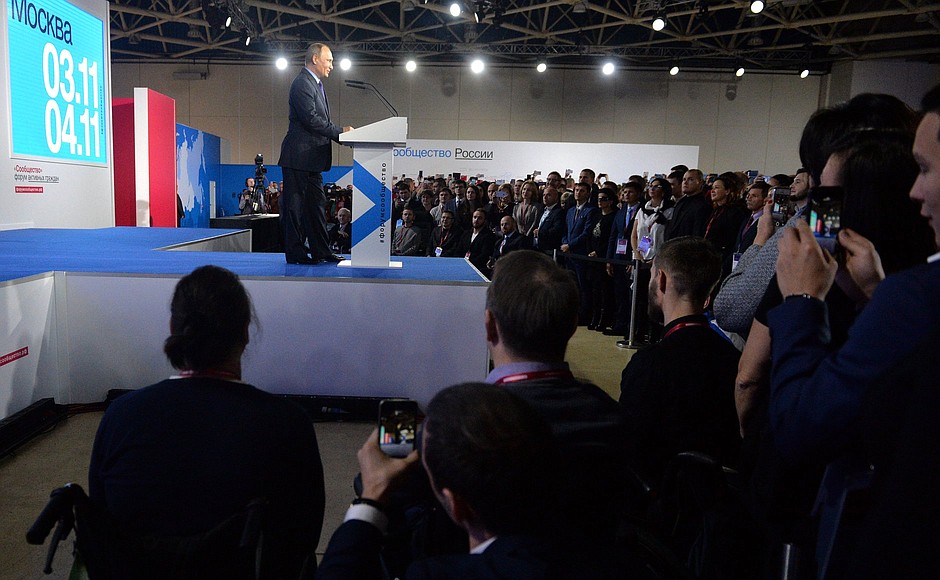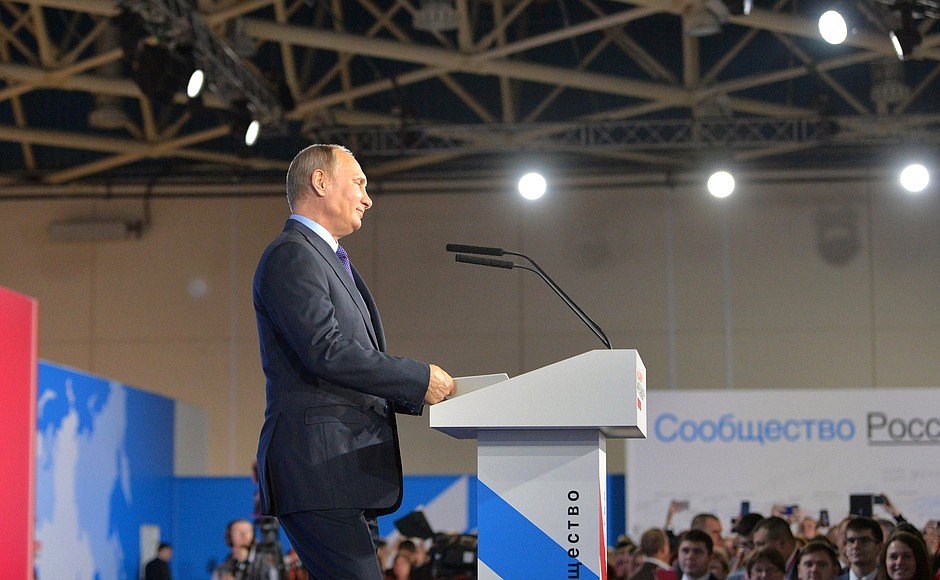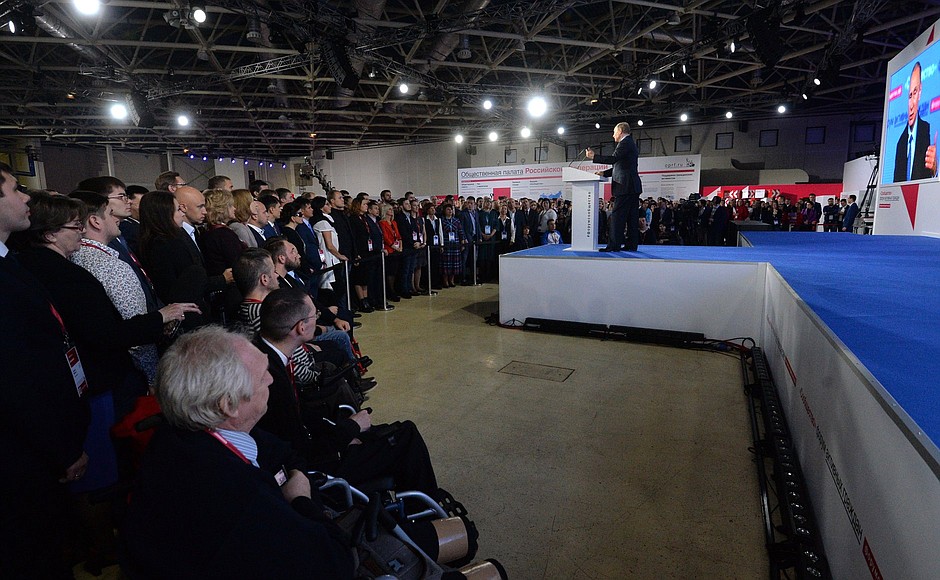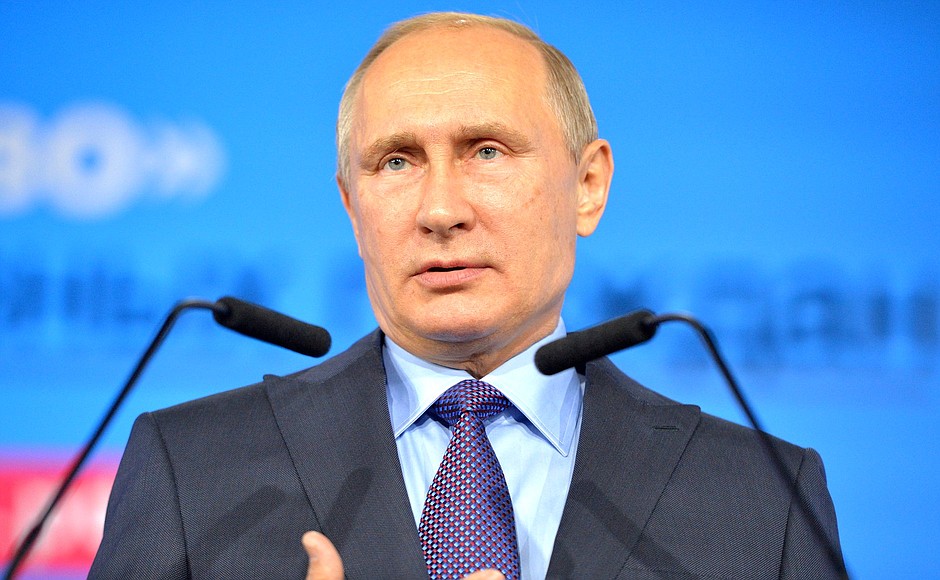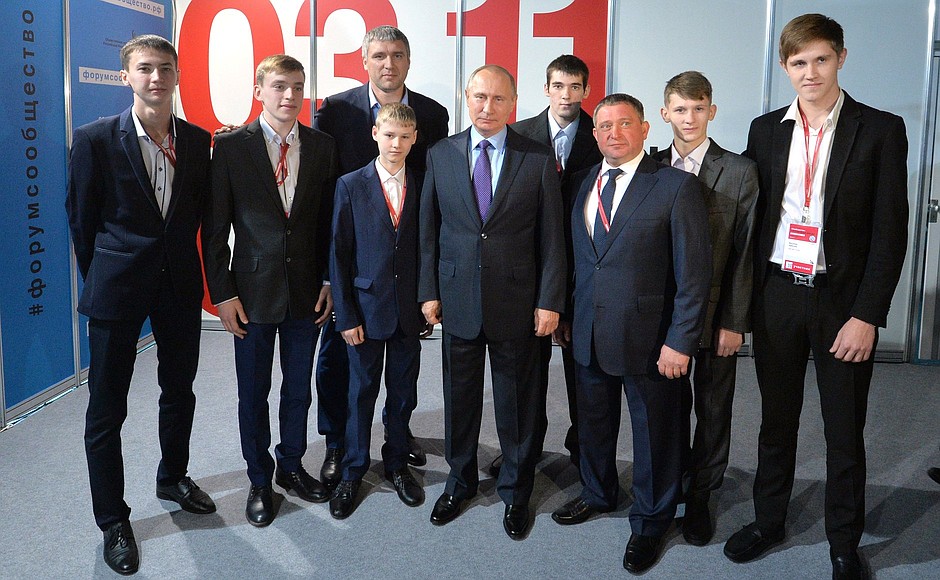Soobschchestvo is a two-day forum of active citizens organised by the Russian Federation Civic Chamber and timed to National Unity Day, which is celebrated on November 4.
The forum was attended by over 3,500 people, including civil society activists and representatives of community-oriented NGOs. They discussed problems faced by non-profit companies in various sectors.
On the forum’s sidelines the President met with the team of the Krasnoyarsk football club Totem that won the latest world championship among football teams from orphanages and boarding schools.
* * *
President of Russia Vladimir Putin: Good afternoon, friends.
This is the second year that the Soobschchestvo forum is being held in all regions of Russia, with the final meeting in Moscow. I could not deny myself the pleasure of coming here to greet you.
It is symbolic that the forum’s final meeting is timed to National Unity Day, a holiday that is closely connected to the idea of citizen activity and the desire of many people of different ages, professions, ethnicities and religions – I see very many people like this here – to come together for the good of the country.
Gathered here today are concerned, active and creative people. Overall, a growing number of people are joining in volunteer activities, contributing to the efforts of non-profit organisations and companies or doing something individually in all regions of Russia.
Their desire to implement their initiatives and to apply their knowledge and experience to socially useful projects is evidence of the growing maturity of Russian society and of the revival of the traditions of volunteering, sponsorship and charity. This generous, selfless work deserves our wholehearted assistance and gratitude.
As you know, we have established a state prize for outstanding achievements in human rights and charity activities, and have expanded the programme of presidential grants for non-commercial organisations. This year, we are according four times more grants than we did in 2012.
Creating the conditions needed to develop civil society and the non-commercial sector have been and will remain one of our unquestioned priorities. In this respect, we consider particularly important the support measures for non-commercial organisations with a social focus, including those helping people with limited possibilities, people in difficult circumstances, and families with disabled children.
The previous forum proposed granting preferences to socially-focused non-commercial organisations that have proved themselves effective. As you know, this matter founds its reflection in the Presidential Address to the Federal Assembly.
We have taken the decisions and made the legal amendments required to establish for non-commercial organisations a separate legal status – that of providers of socially useful services. We have defined 20 priority directions for your work in this area and the Government has approved a list of socially useful services and the criteria for their quality evaluation.
Non-commercial organisations that qualify for this particular legal status will have access to financial resources the state authorities allocate for social purposes. We hope that this will ensure these organisations’ stable work and a higher quality of activity over the next two years at least. I also hope that the new State Duma will act swiftly to examine the necessary amendments to the Budget Code. The mechanism for obtaining this particular legal status will come into effect on January 1, 2017.
Overall, our task is to create a favourable and I would say friendly and well-intentioned environment for developing socially-focused non-commercial organisations. Perhaps it would be good to offer organisations some additional preferences as well, similar to those accorded to small businesses, for example. I expect you to discuss these ideas and formulate your proposals, and I hope very much that they will also be reflected in this year’s Annual Presidential Address.
One important distinguishing feature of the majority of volunteer and charity organisations in Russia is their readiness to work together with the state authorities to resolve our common tasks. Without question, this kind of partnership dramatically increases the effectiveness of our cooperation.
At the same time, we need to develop public supervision mechanisms, including through the system of regional public chambers. As you know, the new law regulating their activity will come into force on January 1 next year. Friends, I appeal to you to get involved in the ongoing monitoring of this law’s implementation.
Civic engagement creates broad new opportunities for working in a team with like-minded people, and it is such people we see here. Trust, solidarity and the simple pleasure of being together all form the foundation of the non-commercial sector’s successful work and constitute a huge resource for achieving concrete results much needed by our society.
The Soobshchestvo forum makes a great, indeed a tremendous, contribution to strengthening cooperation between the various non-commercial organisations. It brings together thousands of representatives of these different teams and offers a platform for an engaged exchange of views, ideas and experience, the chance to discuss problems and difficulties, and to find solutions.
It is always easier to find a way out of even of the most difficult situation when we work together. This is all the more true as not everyone has yet realised the non-commercial sector’s potential and possibilities.
I am sure that with every passing year, your organisations and the people you work with will gain not only experience but also public authority and respect.
I wish you all the very best in your work and hope that we will continue working together.
Thank you for everything you are doing. Thank you very much and good luck.
<…>
